"I was born on third base," middle school principal Rob DeBlois '82 AM says frequently. What he means by this is that he was born with advantages well beyond the reach of most children.
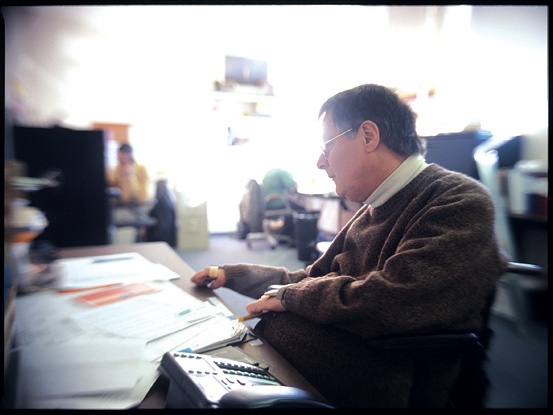
For starters, he is white. DeBlois grew up in an upscale neighborhood across from a country club in Pawtucket, Rhode Island, just outside Providence. His family, which owned a regional oil-distribution company, had the wherewithal to send him to a Jesuit-run boarding school, where he learned not only to love literature but also to value social justice. From there, he went to major in English at the University of New Hampshire. Tall and skinny, DeBlois was a bit of a daredevil and the rebel in a family of conservative Republicans: the one who hitchhiked and was arrested (inmates shaved his head because they didn't like his hippie looks). DeBlois hiked the Appalachian Trail, and once lugged a full turkey dinner into the White Mountains so he and his friends could celebrate Thanksgiving in one of the overnight huts on the trail.
Then, one spring day during his junior year of college, Rob DeBlois dove into an unfamiliar falls and struck his head on a rock beneath the surface. His life would never be the same. "After I broke my neck," he says, "I realized how incredibly lucky I am."
DeBlois has been quadriplegic ever since that accident. He lost the use of his legs and could move only a few muscles in his neck and shoulders, but after six months of rehab therapy he was able to sit up in a wheelchair and return to college. His family rented a house near UNH, and friends looked after him, carrying him wherever his wheelchair couldn't go. Among the most devoted was his college girlfriend, Bonnie Hunt, whom he eventually married. The couple went on to have a son; then they adopted a second from Vietnam and, eventually, a daughter from Russia.
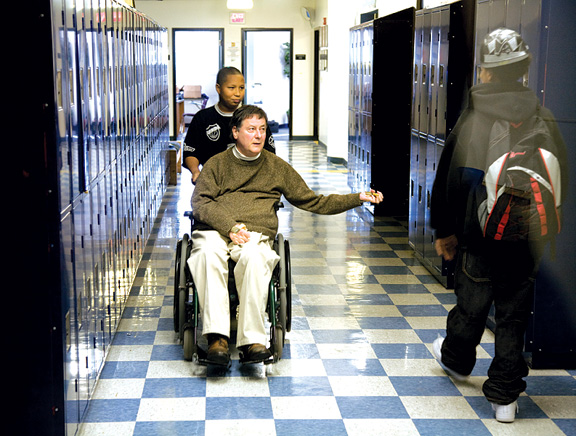
After graduating from UNH in 1976, DeBlois taught at a Providence high school and in an Upward Bound program for three years before enrolling at Brown to earn a master's degree in English. Then, conscious perhaps of his third-base roots, he started SPIRIT, a highly acclaimed summer-school program for at-risk kids in Rhode Island. That success inspired him to go further by starting a school.
Not just any school, though. DeBlois wanted to focus on the students most likely to drop out of public schools. He wanted to stop them from giving up. Although such factors as poverty, truancy, or having a mother who quit school are common among dropouts, DeBlois knew that the single best indicator that a teenager will give up is being retained, or held back a grade, particularly in middle school. To get into DeBlois's school, applicants must have been held back at least one grade level. His school would give them the chance to make up that time so they could enter high school on schedule and with the social and academic skills they need to succeed. "Acceleration—that was the hook," he says.
DeBlois called his school the Urban Collaborative Accelerated Program (UCAP, pronounced "you-cap"). As an independent public school, it offers teachers the same pay as their public-school counterparts, but they are not part of the teachers' union; they are free to tailor their curricula to their students' needs and interests.
"There are 400 reasons a kid gets held up," DeBlois says, and many have nothing to do with intelligence or drive. UCAP's basic assumption is that many students who have been held back in a traditional school can thrive with the right guidance. Its goal is to break the spiral of failure and help students accelerate, asking them not only to pass their courses but to complete two years of middle school in one year, or three in two. Instead of moving lockstep through a standard middle-school curriculum as part of a large group, UCAP students work individually, tackling each required subject with teachers supporting them as coaches.
As if to underline the urgency of DeBlois's crusade, in 1989—the year UCAP opened—Rhode Island's cumulative dropout rate reached 47 percent. Nearly half the teenagers in the state were dropping out of high school, most of them in ninth grade.
Like the kids it serves, UCAP had a rough start. "Every summer for six years we were pink-slipped," recalls curriculum director Chris Cuthbertson '78 MAT, who was teaching at a private girls' school on Providence's East Side when she met DeBlois through the SPIRIT program. She became one of UCAP's founding faculty.
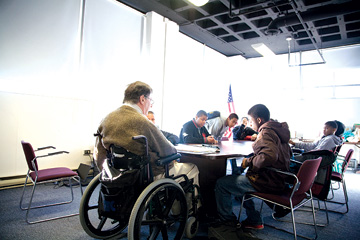
"We could have folded at any time early on," says social worker Al Lemos, who signed on as the school's first counselor. "Rob is like a bulldog. He probably works sixty hours a week, here and then at home, making phone calls at night."
UCAP enrolls students from three Rhode Island school districts—Providence, Cranston, and Central Falls—which each pay UCAP $12,000 a year for every child the school takes off its rolls. Because UCAP relies on local schools for much of its income, whenever one of them pulls out—as Pawtucket, an original member, did in 2005—the school faces financial peril. Further jeopardizing UCAP's stability in the early years was the fact that it didn't own a building; it was uprooted and had to move twice, sharing facilities with other alternative schools.
In addition to fiscal and space problems, the school faced internal growing pains. Education writer Michael Brosnan, who was DeBlois's prep-school roommate, describes those tensions in the book Against the Current: How One School Struggled and Succeeded with At-Risk Teens. DeBlois hired strong-minded, dedicated teachers, some of whom clashed passionately before they figured out how to use their differences to good ends.
A key point of disagreement had to do with the school's twin missions: supporting troubled kids and providing a first-rate education, goals that sometimes seemed mutually exclusive during the first year. Brosnan reports that UCAP idealistically enrolled the neediest of students, teenagers who were seriously behind both academically and in terms of their age. But some of those older kids were too hardened for the teachers to reach and too disruptive to let slide. The following year the school narrowed its sights a little, admitting slightly younger students and seeking out those who seemed genuinely motivated to overcome past failures.
In addition, Brosnan says, that first year the faculty wanted DeBlois to lead more aggressively, but he refused, believing that a top-down leadership style would make UCAP like any other public school--with teachers at odds with the system and students at odds with their teachers. He held his ground. "Rob gives teachers a lot of autonomy over what they do," Lemos says. "He doesn't micromanage. There are lots of opportunities for teachers to be creative."
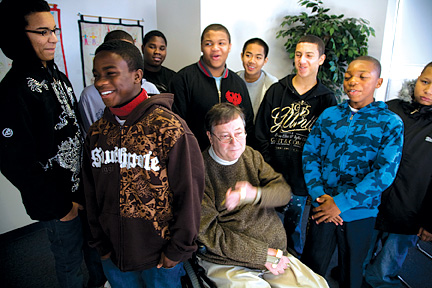
After years of itinerancy, the school now owns its own building in south Providence. Less than a block off Interstate 95, it is flanked by weathered signs for Kelly Tire and Munroe Auto Parts. It's the kind of neighborhood where you park your car warily, wondering if its parts will be stripped and sold before you return. But it's convenient for students; UCAP shares the building with a charter high school, and two of the city's biggest public high schools are just a few blocks away.
Inside, though, the building is cheery, with fresh paint and blue-and-yellow checkered linoleum floors. The walls of the lobby are lined with group photographs taken every year since 1989. UCAP has sent more than 1,100 teenagers on to high school, and a 2007 self-evaluation found that its graduates were 25 percent more likely to complete high school than their peers in the Providence schools.
One morning last fall, school secretary Muriel Marchand sat at her desk in the lobby talking about her nineteen years at the school. The front doors were propped open, letting in sunshine and the thrum of traffic from the interstate. The sound of laughter briefly spilled out of a classroom.
"I nearly quit after the first year," Marchand said. "The kids pushed back hard, and I wasn't used to that." As she talked, a boy bounced across the lobby, leaned over her desk a little sheepishly, and begged her to check his home address on the school's computer. "I just want to make sure you have it right," he said.
"You getting a good report?" she asked teasingly. "You want to make sure it goes home?"
He nodded and grinned, his teeth brilliant against his dark skin.
UCAP recruits at Rhode Island middle schools, making its pitch to students on the edge, offering them the chance to catch up if they're willing to work hard. "The kids bring applications home, and then we interview them," Lemos says. "We don't care how much school they've skipped. They can be out eighty days, but if they have a spark we'll take them." Occasionally, he says, a student will bring a recommendation from a teacher, but the admissions process relies heavily on intuition. "We look for kids who are willing to work hard to do the right thing," Lemos says, "kids who see this as hopeful."
Despite a waiting list that hovers between 50 and 100, the school stays small, enrolling about 140 students. The atmosphere is informal. Kids call teachers by their first names, and work with them one-on-one, setting their own pace. Despite the rowdiness, the school has the close personal feel of a private school; even with enormous effort, a child could not be anonymous there.
That's deliberate. DeBlois says, "Public education does okay in elementary school," where children stay in the same classroom all day and build close relationships with their teachers. In middle schools, he says, "We get schizophrenic. And by high school, teachers think the job is to teach a subject." As the emphasis shifts from relationships to content, students can get lost. Although UCAP students are older than most middle schoolers, "we still operate as a middle school; it's more embracing," DeBlois says.
Many students come to UCAP reading well behind their grade level, so they need additional support to bring them up to speed. Teachers circle the classrooms checking students' work, asking questions, offering guidance, suggesting additional reading in the library, and administering tests. As students prove they've mastered each piece of the material, they earn points. Enough points and they "accelerate," or move ahead.
As long as they aren't disruptive, students too tired or unmotivated to work can sit out a period while their classmates study. One of the school's goals is to teach kids to take responsibility for their own work--something few of them have learned before. Along the way, students earn the self-confidence that comes with accomplishment, which is equally new to them.
Last year, 50 percent of UCAP students were able to skip a grade, and at the school's graduation ceremony in June, faculty announced the high school to which each graduate would be heading in the fall. Students who were staying on received carnations signifying their progress toward acceleration. Students ran the program, singing and emceeing. The girls wore cocktail dresses and sundresses; the boys looked scrubbed and combed in their polo shirts and baggy pants. Tears streamed down one graduate's cheeks as she thanked DeBlois and the faculty "for believing in me when I didn't believe in myself."
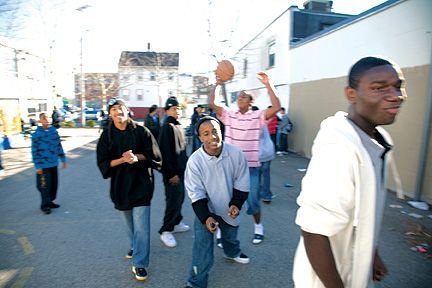
At an all-school assembly this fall, UCAP students jockeyed for seats in the cafeteria, full of energy after the long Rosh Hashanah weekend. Up front, DeBlois called out a long list of names: students he was taking out to lunch to celebrate their perfect attendance records. They hooted and called out as he read off names, prompting teachers to shush them repeatedly. "That's forty-six kids," DeBlois finally announced to applause. (UCAP is working hard to increase its attendance rate; it reached 91 percent last year, up from 87 percent—lowest in the state—the year before.)
A teacher reported that a hike scheduled for the coming Saturday was full; thirteen students had signed up. Another teacher offered to help if students knew adults who needed assistance registering to vote in the upcoming presidential election.
The librarian tried hard to sell a noon book-club meeting, but she was up against DeBlois's free lunch. "Who's coming?" she called out. "No hands? Oh, c'mon!"
The $12,000 the school systems ante up for each of these students covers only the basics. But teenagers--especially those who are already behind in their work and who go home to empty houses in dangerous neighborhoods--need a lot more than a few hours of academic work a day. To keep students safe and to provide the support they need, UCAP runs after-school homework clubs and a Saturday school, where teachers give extra help in problem subjects. Faculty lead field trips and take students ice-skating in the winter and on hikes in good weather. They run vacation camps. They coach. Despite the fact that the school has no gym, the boy's basketball team won the state championship in 2007. They celebrated with an all-you-can eat buffet.
UCAP now employs two full-time counselors, who spend their summers meeting students at home to see what challenges they bring to the classroom. "These kids are so strong," Lemos says. "Just to get here each day is an accomplishment."
One of the most obvious differences between UCAP and suburban middle schools is the lack of helicopter parents micromanaging science projects and editing their children's essays. UCAP parents might wish to do these things—some even attend Saturday detention with their kids—but few have the time or the education to supervise schoolwork. Plus, English is a second language for many of these parents, and they don't have the literacy skills to help their kids. In 2007, UCAP received a $500,000, five-year grant to help these parents navigate the school system and advocate for their children. The grant will fund field trips for parents, and literacy training at Dorcas Place, a Providence learning center for low-income adults.
UCAP's annual tab for enrichment programs runs about $300,000 a year, and DeBlois and the school's development officer are constantly raising money. With $2 million in reserves, UCAP is about to embark on a $3,000,000 capital campaign. The money is for DeBlois's latest dream, which is represented by a white architect's model in his office. He plans to build another floor on top of the school to house a basketball gym, a science lab, and an atrium meeting space with a rooftop garden, which will be the only green space in sight.
The University of Rhode Island recognized De-Blois's accomplishments with an honorary doctor of pedagogy in 1993. He jokes that he can now put to rest his dreams of going back to school for a PhD. Among numerous other awards, he won a National Caring Award from the Caring Institute in 1998.
Last spring, UCAP received a boost when Accelerating America, a film about the school, screened at the Seattle International Film Festival and then won the documentary grand prize at the Rhode Island International Film festival in August. It's scheduled for digital release this spring. Timothy Hotchner '95, who met DeBlois as a Brown undergraduate, directed it. An education concentrator, Hotchner had wanted to make a screenplay about an educator who was making a difference, and then-education professor Faynese Miller sent him to DeBlois. Although his student screenplay never made it to film, Hotchner remained commited to it, and in 2004, he got back in touch with DeBlois, asking permission to make a documentary.
"Rob said, 'Oh, you gonna make your cripple film?'" Hotchner recalls. "I told him I wanted to focus on students. He thought about it a few minutes and said yes." The film follows three students through a year at UCAP: Jason Levesque, a stalwart white boy who's been told he is stupid, blooms in the new setting as his new teachers force him to see otherwise. Yazmine Lopez constantly skips school and swears at teachers ("I got a anger problem. I can't keep my mouth shut," she tells Hotchner). But DeBlois's tough love and consistent discipline wear her down. She winds up in college, studying criminal justice.
But there's a sobering story here, too. The most charismatic student in the film is a smart, sassy fourteen-year-old named America Minaya, who has bounced around the foster-care system since her brother tried to rape her. Her family moved back to the Dominican Republic without telling her, and although UCAP staff find her a group home to live in and a therapist to talk to, she walks out on them.
DeBlois saw her at the film's screening last summer. She has a baby and has dropped out of school. "It's not a great situation," he said. "But she's alive--that's something. I'm serious." The hardest part of his job, he says, is seeing kids make the same mistakes again and again: "Teachers burn out not from working hard but from the feeling they're not making a difference."
DeBlois hopes Hotchner's film will open the eyes of the wealthy to the difficulties impoverished kids face each day and the hurdles they must climb just to get to school. "I hear people talk about how the schools are throwing money at these problems," he said. "I've never had money thrown at me. Those same people will turn around and spend $35,000 for a private-school education; they provide their kids with opportunities to travel and study musical instruments. Meanwhile these kids are born low birth weight and many have lead poisoning from their environments; these are the kids we're spending $12,000 a year to educate.
"People see a group of these kids at the bus stop," DeBlois continued, "and they walk around them, giving them a wide berth. If only people of influence could think of these kids as their children—not other people's children."
Charlotte Bruce Harvey is the BAM's managing editor. For more information about the Urban Collaborative Accelerated Program and Accelerating America, go to UCAP.org and AcceleratingAmerica.com




